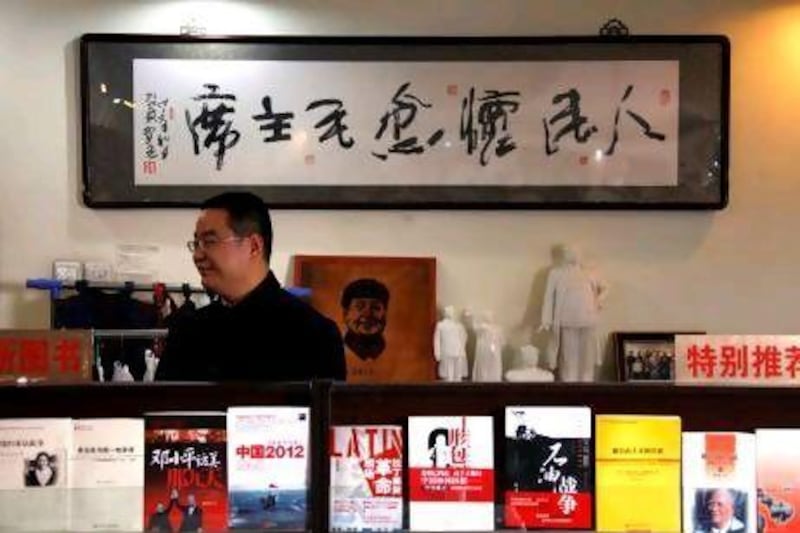BEIJING // There is a clock on the wall featuring Mao Zedong's image, a rack of T-shirts showing Mao waving to a crowd and several mini statues and busts of the former Chinese leader on a bookshelf.
More than 35 years since his death, the man who led the communist takeover of China is still a hero at Utopia, a bookshop in north-west Beijing.
Until recently, the dedicated band of leftists who ran Utopia and its website from hard-to-find sixth floor premises had a modern-day figure to look up to, someone they hoped would bring about a return to the policies of the Mao era and halt the country's economic reforms.
Bo Xilai, until recently the party chief of Chongqing, brazenly advanced an agenda of heavy state intervention in the economy and huge public housing programmes, while launching a campaign to encourage nostalgia for the early days of Communist Party rule.
Just as Mr Bo's star has fallen dramatically, with his removal from Chongqing and suspension from the politburo, Utopia's fortunes have nosedived.
Since Mr Bo was purged, the website has been shut down by the authorities and Fan Jinggang, co-founder and general manager, says it is unlikely to go back online "any time soon".
Defiant in the face of the blackout, Utopia recently released a statement saying allegations levelled against Mr Bo were fabricated, branding his downfall and that of his police chief, Wang Lijun, as the "biggest cases of political injustice" for decades.
Although the website is offline, the 35-year-old Mr Fan, whose wristwatch bears an image of Mao as a young man, is still willing to talk about his cause in public.
Mr Fan sees communist China as having turned its back on the ideals on which it was founded. Despite the dramatic downfall of the hard-left's champion, described with understatement as "a setback" for the movement, he calls for the country to adopt the "Chongqing model".
"Some people were saying it was as though the real Communist Party had come back. It's like what Chairman Mao said - it's what the Communist Party should be like," he said, hailing efforts by Mr Bo to encourage party officials to become less distanced from the public and more willing to listen to the concerns of ordinary people.
He reels off a string of what he regards as successes in the south-west municipality: improved treatment of migrant workers, often regarded as an "unpleasant presence" elsewhere, a crackdown on "corrupt officials" and a high happiness index, with the city tending to perform well in surveys of residents' wellbeing.
By contrast, he sees a litany of failures in China as it continues to embrace capitalism or "socialism with Chinese characteristics", even though many argue this has provided relative stability and lifted hundreds of millions out of poverty after decades of chaos and fanaticism under Mao.
Mr Fan blames the "neoliberal" agenda for unaffordable housing, layoffs at state-owned enterprises, inadequate welfare systems, poverty that spurs farmers to flee their land and move to the cities and for migrants being "robbed of their human rights". Officials have made an alliance with "so-called entrepreneurs" and "robbed the people", he said.
"China is now very much a polarised society, where the rich people take one end and the poor and powerless take the other.
"These people, they've kidnapped the country politically and economically. They hold these monopolies over China's political power ... They control the public opinion by state ownership and the public broadcasters and print media.
"It takes poor people to fight against these people and push for change. They can't wait and expect the change to fall from the sky."
While Mr Fan can fairly be described as belonging to the political fringe in China, Utopia is often cited as one of the most prominent of a series of leftist websites.
Before it was shut down along with other neo-Maoist websites, Utopia claimed half a million visitors a day and was seen as a key site for left-wing debate.
Recognising that China's iPhone-wielding, Gucci-wearing masses appear to have embraced capitalism and conspicuous consumption with a vengeance, Mr Fan says public support for Utopia is widespread.
"People find they share some ideas in common with us. They may not necessarily agree with our policy initiatives, but at least they agree these problems exist and there should be solutions to them," he said.
He is emphatically not calling for the overthrow of the Communist Party and does not criticise any current leaders. In an hour-long interview in a room adjoining the bookstore, which is piled high with volumes such as Casino Capitalism and China's Dilemma, the only names mentioned are those Chairman Mao, Mr Bo and Deng Xiaoping.
Undeterred by Mr Bo's fall, Mr Fan says the party must return to its original purpose by reasserting state control on industry and the economy and improving health care and welfare provisions. There is "an urgent need to correct these market reforms".
With China gearing up for a once-in-a-decade leadership transition expected to begin late this year, he warns failure to change course risks serious consequences.
"If the trend continues, the party will lose power and the country will collapse in this coming administration," he said.
"But if they act as more of a champion of the ordinary people, the country might take a turn for the better. It's a matter of how they are going to choose."
dbardsley@thenatonal.ae






